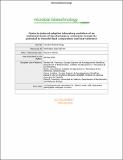Por favor, use este identificador para citar o enlazar a este item:
http://hdl.handle.net/10261/205255COMPARTIR / EXPORTAR:
 SHARE
BASE SHARE
BASE
|
|
| Visualizar otros formatos: MARC | Dublin Core | RDF | ORE | MODS | METS | DIDL | DATACITE | |

| Título: | Myriocin‐induced adaptive laboratory evolution of an industrial strain of Saccharomyces cerevisiae reveals its potential to remodel lipid composition and heat tolerance |
Autor: | Rández Gil, Francisca CSIC ORCID; Prieto Alamán, José Antonio CSIC ORCID; Rodríguez Puchades, Alejandro; Casas, Josefina CSIC ORCID ; Sentandreu, Vicente; Estruch, Francisco | Palabras clave: | Saccharomyces cerevisiae Baker’s yeast Heat-stress Sphingolipid Phospholipid Sphingoid bases Triacylgliceride Ploidy level |
Fecha de publicación: | 25-mar-2020 | Editor: | Society for Applied Microbiology | Citación: | Microbial Biotechnology 13(4): 1066-1081 (2020) | Resumen: | The modification of lipid composition allows cells to adjust membrane biophysical properties in response to changes in environmental temperature. Here, we use adaptive laboratory evolution (ALE) in the presence of myriocin, a sphingolipid (SLs) biosynthesis inhibitor, to remodel the lipid profile of an industrial yeast strain (LH) of Saccharomyces cerevisiae. The approach enabled to obtain a heterogeneous population (LHev) of myriocin‐tolerant evolved clones characterized by its growth capacity at high temperature. Myriocin exposure also caused tolerance to soraphen A, an inhibitor of the acetyl‐CoA carboxylase Acc1, the rate‐limiting enzyme in fatty acid de novo production, supporting a change in lipid metabolism during ALE. In line with this, characterization of two randomly selected clones, LH03 and LH09, showed the presence of lipids with increased saturation degree and reduced acyl length. In addition, the clone LH03, which displays the greater improvement in fitness at 40°C, exhibited higher SL content as compared with the parental strain. Analysis of the LH03 and LH09 genomes revealed a loss of chromosomes affecting genes that have a role in fatty acid synthesis and elongation. The link between ploidy level and growth at high temperature was further supported by the analysis of a fully isogenic set of yeast strains with ploidy between 1N and 4N which showed that the loss of genome content provides heat tolerance. Consistent with this, a thermotolerant evolved population (LH40°) generated from the parental LH strain by heat‐driven ALE exhibited a reduction in the chromosome copy number. Thus, our results identify myriocin‐driven evolution as a powerful approach to investigate the mechanisms of acquired thermotolerance and to generate improved strains. | Versión del editor: | https://doi.org/10.1111/1751-7915.13555 | URI: | http://hdl.handle.net/10261/205255 | E-ISSN: | 1751-7915 |
| Aparece en las colecciones: | (IATA) Artículos |
Ficheros en este ítem:
| Fichero | Descripción | Tamaño | Formato | |
|---|---|---|---|---|
| MicrobBiotech2020-Randez.pdf | Artículo principal | 927,11 kB | Adobe PDF |  Visualizar/Abrir |
| MICBIOTECH2020-Randez-postprint.pdf | Version autor + material suplementario | 1,43 MB | Adobe PDF |  Visualizar/Abrir |
CORE Recommender
Page view(s)
169
checked on 13-may-2024
Download(s)
276
checked on 13-may-2024
Google ScholarTM
Check
Este item está licenciado bajo una Licencia Creative Commons

